

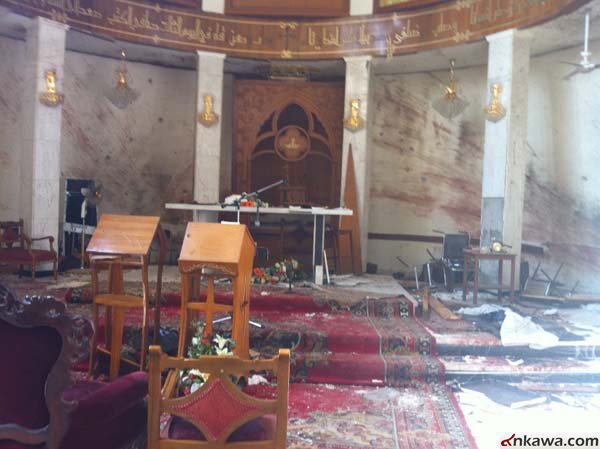 Paris (AINA) -- On Sunday afternoon, October 31, Muslim terrorists stormed into Our Lady of Deliverance Syriac Catholic church in central Baghdad during the evening mass. Forty four parishioners, two priests, seven policemen and soldiers as well as five of the terrorists were killed. This particular section of the Iraqi capitol should have been safer than any other. The Islamic State of Iraq, Al-Qaida's Iraqi branch, took responsibility for this act of terror. Fifty persons survived the attack, some because they were hidden in the sacristy or because they were lying among the bodies and pretending to be dead. A week after the attack thirty five of the most badly wounded were flown to a hospital in France. Freelance journalist Nuri Kino and photographer Saima Altunkaya flew to Paris to meet with them.
Paris (AINA) -- On Sunday afternoon, October 31, Muslim terrorists stormed into Our Lady of Deliverance Syriac Catholic church in central Baghdad during the evening mass. Forty four parishioners, two priests, seven policemen and soldiers as well as five of the terrorists were killed. This particular section of the Iraqi capitol should have been safer than any other. The Islamic State of Iraq, Al-Qaida's Iraqi branch, took responsibility for this act of terror. Fifty persons survived the attack, some because they were hidden in the sacristy or because they were lying among the bodies and pretending to be dead. A week after the attack thirty five of the most badly wounded were flown to a hospital in France. Freelance journalist Nuri Kino and photographer Saima Altunkaya flew to Paris to meet with them.
"The time was around a quarter after five when the priest began his sermon. We heard shots outside the church but they didn't bother us since it's certainly not unusual in Baghdad. But then there was an ear-splitting explosion. It threw me across the pew in front of me. I turned around and saw that it was the church doors that had been blown open. I had been hit by splinters and I was bleeding. The terrorists entered and shot wildly with sub-machine guns. The firing was aggressive, the sound, deafening. In the beginning I saw nothing and I didn't dare to turn around to look at what was happening behind me. I fell to the floor. It became reasonably calm for a few seconds until they began screaming that Christians are unfaithful dogs and bitches; that we are the enemies of Iraq, and all the traitors shall die!"
The person relating this is a sixteen year-old girl. She belonged to the church choir. Sunday is an ordinary working day in Iraq. This means that some go to school or work and attend church in the evening. This was why so many young people were in church for that particular Mass. The loss of so many of the young was a great loss for the church and the community -- though the majority of Christians have already left the city. This girl was one of the thirty five wounded who were met by twenty five ambulances and the French Migration Minister at a Paris airport barely a week after the massacre. Together with twenty five relatives they received a temporary residency permit and will be cared for until they have recovered.
Elish Yako of Association d'entraide aux minorités d'Orient (AEMO), reacted very strongly to the news of the massacre. Friends of his in Baghdad informed him a couple of days after the mass murder that there was no adequate care for the crippled and the wounded. The board of his organization decided to approach the French government. Three days after this first contact an aircraft with ten doctors on board landed at Baghdad's airport.
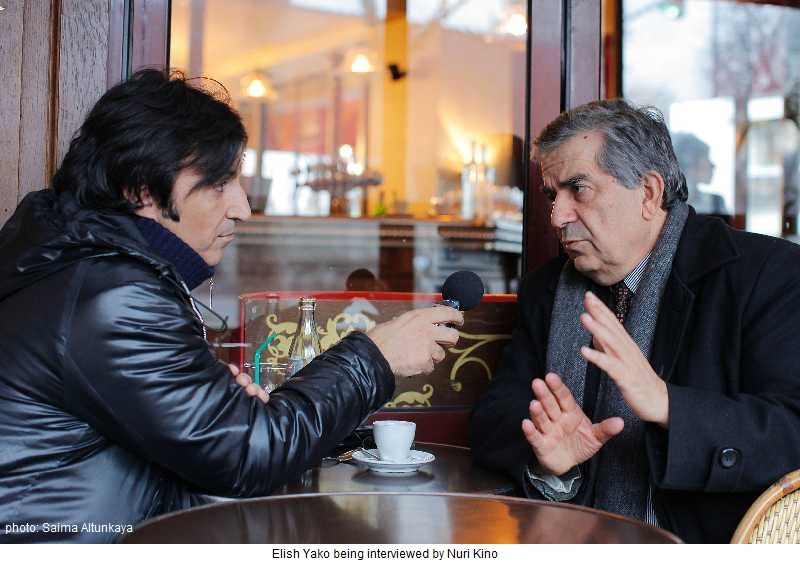
"Three weeks after they landed I still haven't had time to eat dinner with my wife," says Elish Yako. "Members of our organization are with them all the time. We want them to feel that we are their family. They carry with them gruesome experiences; many of the survivors were hit by body parts of the terrorists after they had blown themselves up. These left scars in the soul. Besides this, many have lost family members and friends. The physical injuries are just as indescribable, many have had limbs amputated and others have internal injuries, the majority still have bullets and shrapnel in their bodies."
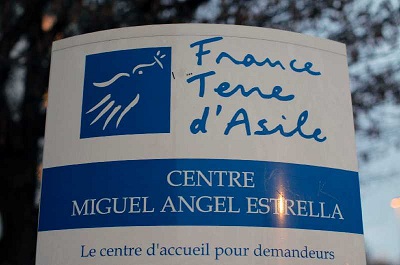 We wanted to hear these stories ourselves, to listen as they related them in person. We would try to capture their stories in words and pictures. We spoke to seven survivors on the phone and after many delays we received the address of a location outside of Paris where some of them were to be found. They did not want to meet journalists; they were frightened that they would be attacked, even in Paris, and that their family and other Christians who remained in Iraq could be subject to reprisals. They had heard that interviews can provoke terrorists to carry out additional attacks. Three days after the church massacre the Islamic State of Iraq announced that all Christians were legitimate targets for mujahedias, meaning that it was not only permitted but required for Muslims to murder Christians in Iraq.
We wanted to hear these stories ourselves, to listen as they related them in person. We would try to capture their stories in words and pictures. We spoke to seven survivors on the phone and after many delays we received the address of a location outside of Paris where some of them were to be found. They did not want to meet journalists; they were frightened that they would be attacked, even in Paris, and that their family and other Christians who remained in Iraq could be subject to reprisals. They had heard that interviews can provoke terrorists to carry out additional attacks. Three days after the church massacre the Islamic State of Iraq announced that all Christians were legitimate targets for mujahedias, meaning that it was not only permitted but required for Muslims to murder Christians in Iraq.
When we arrived at the location at about five in the afternoon, some twenty of them sat and chatted in the hall. It was a group of all ages. The youngest was a little boy of about two. Three of them permitted us to interview them on tape. One of them was the girl we quoted earlier. We sat in the dining room and they permitted us 15 minutes to make our interviews. There was a clatter from the kitchen; the kitchen staff was preparing the evening meal while we interviewed the girl and two others. The chef of that cold and lifeless dining room signalled that we had only a quarter of an hour, not a minute more. I smiled back at him, switched on the tape recorder and let the girl continue her story. When she was lying on the floor her cell phone began to ring as did many others. It was from family members who wanted to know that their relatives were safe. No one answered. Either they didn't dare or they were dead. The girl shielded the phone with her body and sent a text message to a friend asking her to contact her parents and tell them that she loved them, that she was wounded but not dead.
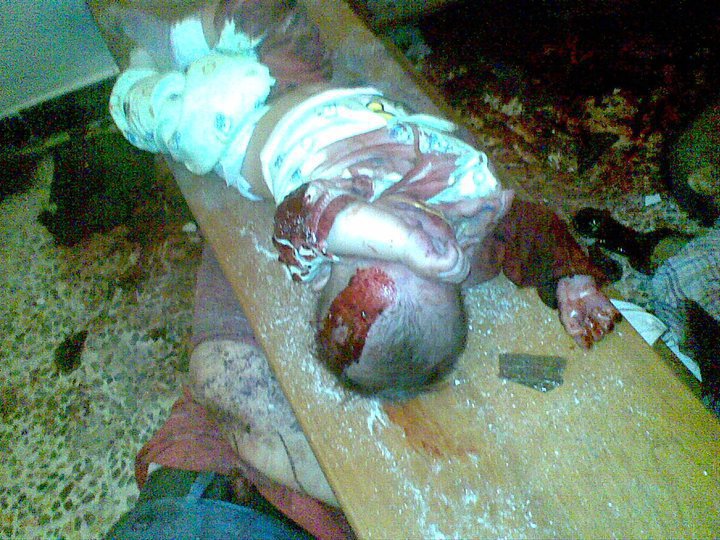 "I stopped hearing, there was something wrong with my ears. I thought I would faint again but I could hear their voices. One of them was standing near me, I pretended I was dead and stopped breathing. He kicked my friend Fadis in the head to check if he was alive. They repeated certain sentences, they shouted 'long live the Iraqi Islamic Republic' and 'Allah u Akhbar' with loud voices. Then it exploded once again, the sound was deafening. One of them had blown himself up. Then the firing began again. They shot from left to right around the entire church as if to celebrate. And then it became quiet. I heard one of them, it was as if he was speaking on the phone, he said they were in the church, they had reached their target and were taking hostages. He didn't speak Iraqi or a Baghdad dialect or any other kind of Iraqi Arabic. The ammunition had run out and now several terrorist would blow themselves up."
"I stopped hearing, there was something wrong with my ears. I thought I would faint again but I could hear their voices. One of them was standing near me, I pretended I was dead and stopped breathing. He kicked my friend Fadis in the head to check if he was alive. They repeated certain sentences, they shouted 'long live the Iraqi Islamic Republic' and 'Allah u Akhbar' with loud voices. Then it exploded once again, the sound was deafening. One of them had blown himself up. Then the firing began again. They shot from left to right around the entire church as if to celebrate. And then it became quiet. I heard one of them, it was as if he was speaking on the phone, he said they were in the church, they had reached their target and were taking hostages. He didn't speak Iraqi or a Baghdad dialect or any other kind of Iraqi Arabic. The ammunition had run out and now several terrorist would blow themselves up."
We let the girl rest for a moment and turned to the choirmaster of the church. The dining room boss signalled that our 15 minutes were over. I smiled and turned the microphone to the choirmaster. He told us that he had lumbago that day and couldn't participate in the Mass but his brother and sister sat in the church.
When the doors were blown open a number of parishioners fled into the sacristy. It was a small room; people were laying atop each other. They locked the door behind them and piled furniture behind it so as to prevent anyone from coming in. Of the three priests in the church, the only surviving one was with them in the sacristy; he is also in Paris now.
The choirmaster first found out what had happened when a friend called him and asked if he was in the church. Evidently, the al-Qaida terrorists had taken hostages in the church. The choirmaster was beside himself with worry. He got into his car and drove to the church but his way was blocked by police and the military and he couldn't drive in the area. While he was circling around he called his siblings but no one replied. He persisted in ringing and finally his brother answered. He and his sister were among those who hid in the sacristy. The time had not passed six and the terrorists still had no idea that there were people hiding in the sacristy. While speaking with his brother on the phone they suddenly heard a man yelling 'Allah u Akbar' and the sound of gunshots. But they didn't know who the terrorists were, which of their relatives and friends were still alive and which of them had been shot.
"I tried to calm my brother and sister, spoke reassuringly with them but my brother had lost his nerve. He had lived abroad for the past five years and never heard gunfire before. He had no experience of this earlier. I heard the gunshots in my phone and lied to my brother by telling him that it was the police who shot at the terrorists, that they should remain calm and that there was no danger. I told them that the police and the army would kill the terrorists before they discovered that people were hiding in the sacristy.
I continued to call my siblings, we spoke and the line was lost, I called again and we spoke and the line was lost. The terrorists had discovered the hiding place. They tossed three grenades at the door, the first two hurt no one but when the third was thrown in I was on the phone with my brother and heard my sister scream and the line was lost. I called her again and I could hear that my sister was panic-stricken. She could see that my brother's arm was split open and he was bleeding badly. He had fainted. She said to me that he had died. She didn't see that she herself was hit; there were so many corpses at her feet that she didn't even notice that she lost her toes. She said that she was also going to die and that I should take care of our parents and take care of myself. She now said that she was bleeding and was near to death, said farewell and hung up. I lost my head; all I wanted was to shoot someone. I thought my brother and sister were dead, I wanted to be the one that carried their bodies out of the church."
Afterwards the choirmaster drove wildly from one hospital to the other. Someone had said to him that his siblings had survived but were badly wounded. His bother lost an arm, a hand and part of a foot. Besides which he had splinters from the grenade all over his body. His sister lost several toes. Both of them are among those being cared for in Paris.
The chef from the dining room came over to talk to us. He said that we actually talked for over a half an hour despite the fact that we were assigned only 15 minutes. I begged for a few more minutes. He shook his head and went back to the kitchen and began to stir a sauce. The third person I taped was a woman whose child is being treated for a punctured lung, among other things. I asked her if she knew any of those who were killed.
"Of course, we were like one large family in the church, including Father Wasim and Father Thaher, who took care of everything in the church and who were kind and polite to all of us. Many of our relatives became martyrs; our friends, our family was wiped out. Friends of my children, two brothers and their mother, were killed and they left a poor, blind and sick father at home alone. My daughter's friend, a recently wed bride who was pregnant in her second month was killed. Dadi, who was the leader of the choir, was killed and his pregnant wife was wounded. A pair of siblings of my children's other close friend were badly wounded. Many, many were wounded and killed…" She began to cry and continued counting the dead and wounded, and then she stopped herself and said "We don't want to leave our homeland, we don't want to live like refugees but the situation has not become better, the threat facing the Christians has increased not lessened. We Christian Assyrians, together with other non-Muslim folk groups are the original inhabitants of Iraq. Those who were in the church heard the terrorists screaming that this attack was only the beginning of the genocide of Iraqi Christians. There will be more such outrages."
We left the dining room before anyone came to order us to leave. It was the only room the management of the hospital allowed us to use for interviews. The young girl told us before we left that she and the other survivors were forced to step carefully as they left the church so as not to step on bodies and body parts of relatives and friends as they walked out. That was almost the worst of all, she said.
Mass held at St. Ephrem Syriac Orthodox Church, Paris, for the victims of the Baghdad church massacre. The Patriarch of the Syriac Catholic Church, Ignace Joseph III Younan, came from Beirut to pray with the survivors of the massacre and to thank the French government for its support.
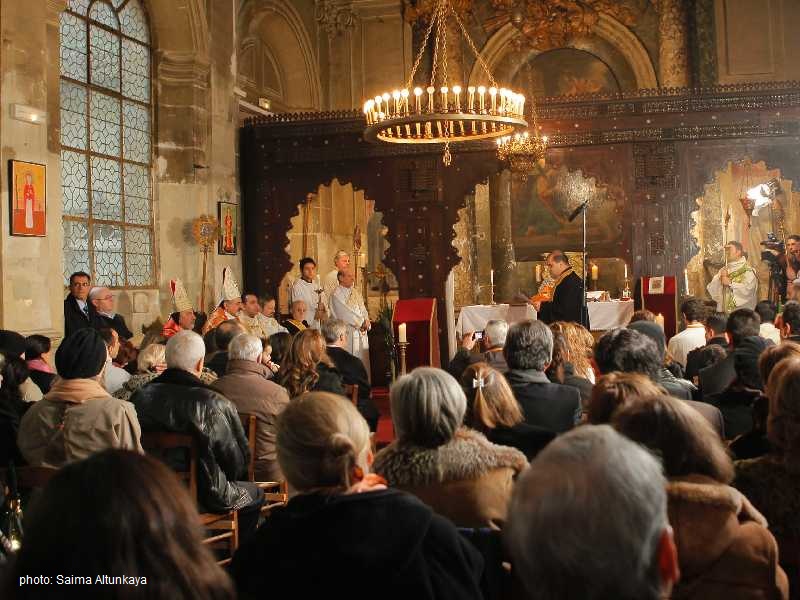
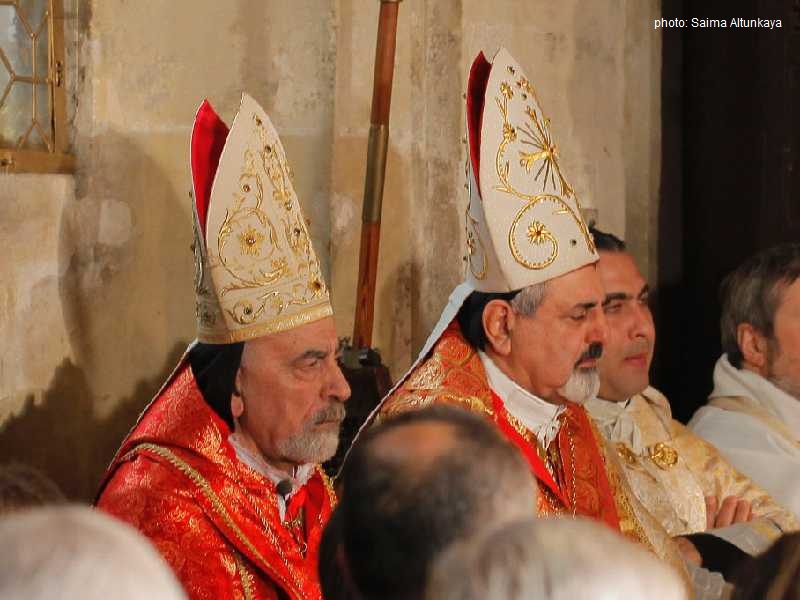

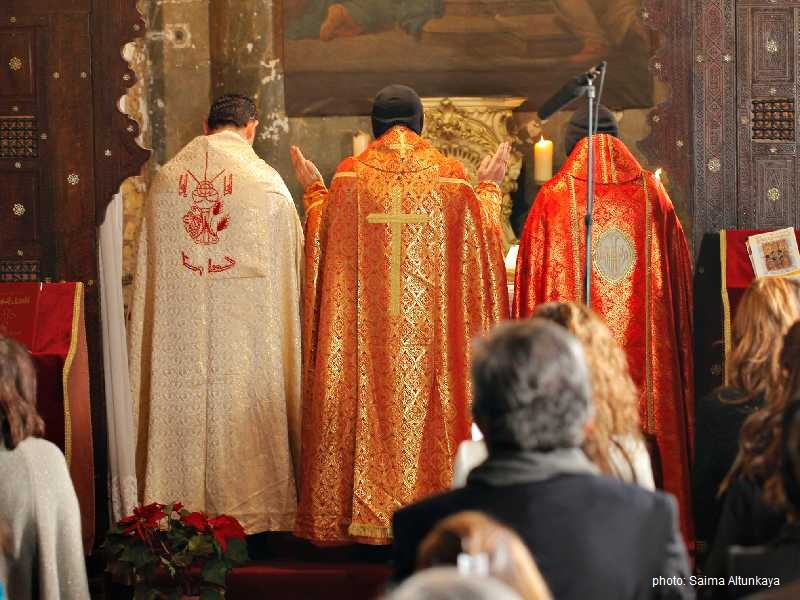
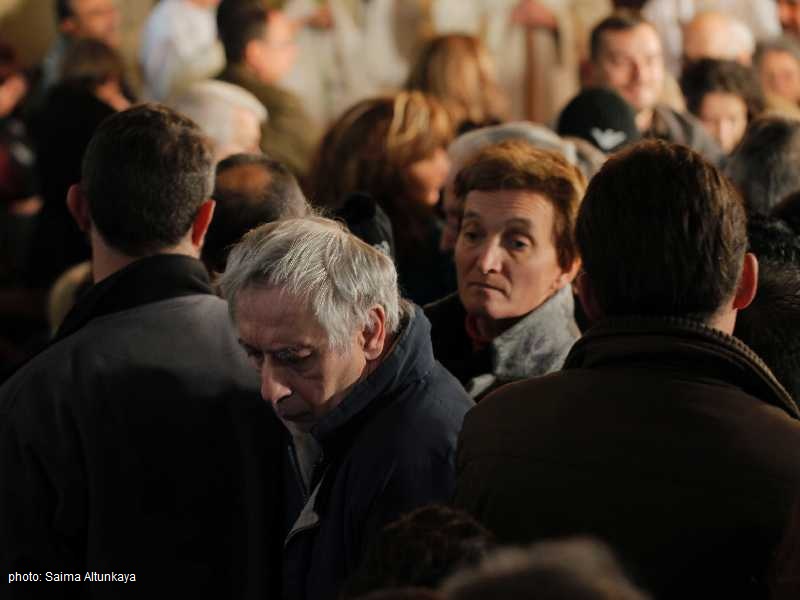
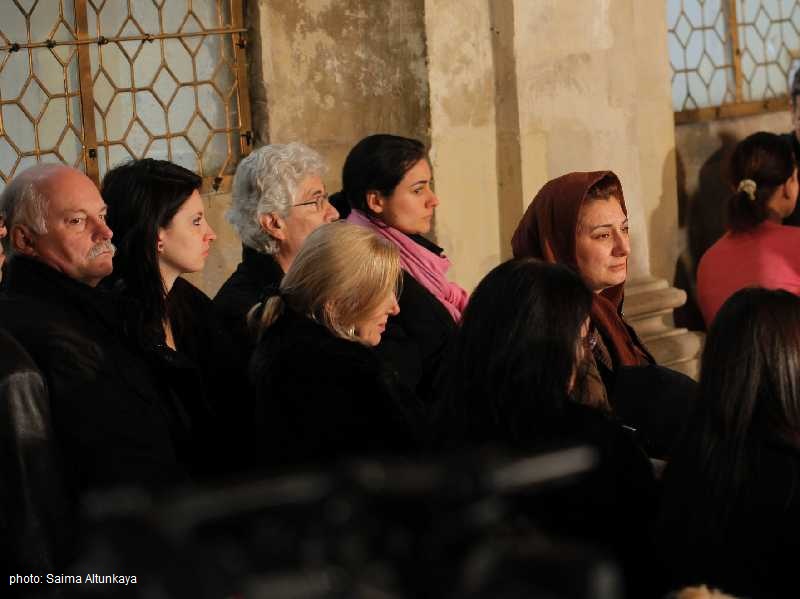
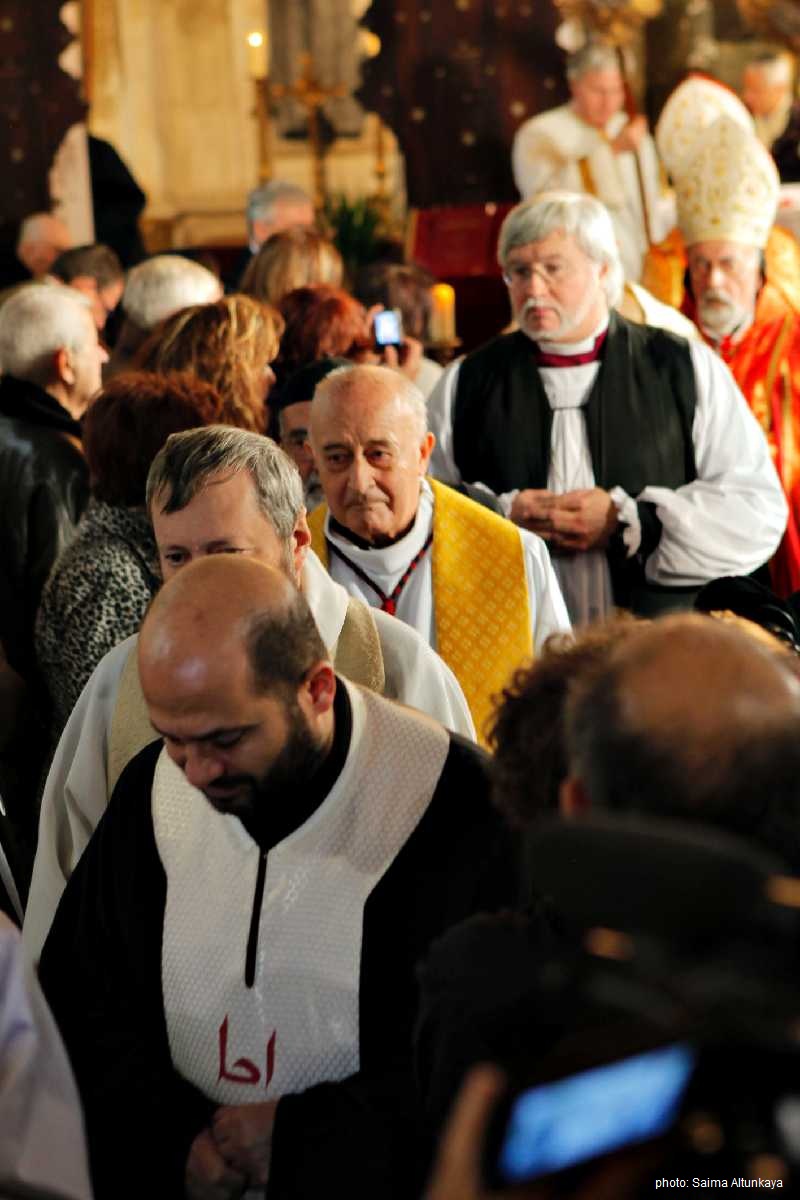
Click here for pictures from inside Our Lady of Deliverance Syriac Catholic Church. WARNING: violent, graphic images.
Editor's note: Nuri Kino was not allowed to photograph the survivors.

or register to post a comment.